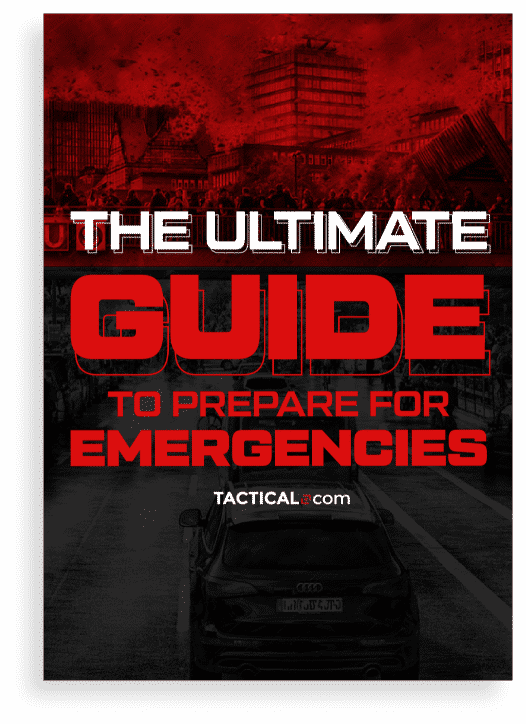We humans have grown to rely on modern technology for most of our daily needs. But what happens when things go wrong, and you’re left with nothing but the barest necessities?
Can you survive the elements or last without food or water?
Sometimes survival can boil down to these six basic survival skills that might just keep you alive in case SHTF.
Basic Survival Skill 1: Having The Right Mental Attitude

Keeping a good head on your shoulders might just be that one thing that could save your life in any situation. There’s nothing more important than keeping the right mental attitude in cases of emergency and survival. This allows you to set goals and create a plan of action. You have to keep your focus on the things that you can control. Most importantly, you have to avoid panicking.
When setting goals, don’t forget to consider the rule of 3 in basic survival. A person can go for as long as:
- 3 minutes without air
- 3 hours without shelter
- 3 days without water
- 3 weeks without food
This simple rule of thumb can help you prioritize and plan what to do next, depending on your situation and environment.
Basic Survival Skill 2: Finding Or Making A Survival Shelter
Looking at the rule of three, you can only last about 3 hours without proper shelter, especially in really harsh environments and conditions. This means you’d probably be in big trouble if you can’t find or build a suitable shelter that could protect you from cold, heat, or even predators.
The sooner you can find a natural shelter, the better. Sites like caves or crevices fit this bill. That way you can save precious time and energy.
If you can’t find any, then you’ll have to make one. Here’s a handy guide on how to make your own shelter. Lean-to’s and teepees are relatively easy to make, too. You can also use materials like saplings, twine, and leaves. If possible, make it near food or water sources.

GET OUT OF DODGE BEFORE DISASTER STRIKES!
You’d want to make sure to put a layer on the ground so that you’re not sleeping directly on the dirt. Sleeping directly on the ground would cause you to lose heat.
Keep in mind that wearing the right clothing can also increase your chances of survival. Your clothes are the first line of defense against the environment.
Basic Survival Skill 3: Learning To Build A Fire

Hypothermia can very well kill you in the wild, especially in cold climates, so knowing how to build a fire is a basic survival skill you have to master. Besides heat, you also need fire to cook your food and boil your water. It’s also a source of light when you need to spend the night outdoors.
Remember that to get a fire going, you’d need air, fuel, and ignition. This infographic shows the ideal types of tinder, kindling, and fuel to keep your fire going.
You can prepare firestarters of your own using common household items.
Basic Survival Skill 4: Finding and Purifying Water
You can survive three days tops without water, depending on your physical capability and the environment. But you’d want to avoid that situation at all costs. Dehydration is fatal. You can lose a whole lot of water just by staying out in the sun.
Rule of thumb: avoid taking from stagnant water. Stagnant water contains a lot of bacteria and pathogens, and drinking it would cause more harm than good. There are numerous ways to find water in the wild. However, merely finding a water source is not enough. You have to make sure that you can actually drink it.
There are a lot of ways to purify water to make it safe for consumption, the most common ones being boiling, filtering, and chemical treatment. Check out the video above to learn how to purify water through boiling.
Basic Survival Skill 5: Gathering Food
Knowing how to find or capture your next meal is one survival skill that’s sadly overlooked. Obviously, you need food to survive. If you have emergency food with you, then great. You’ll need to ration and store them properly. But what if your provisions run out? How will you keep your belly full.
Luckily, there are many edible plants you can eat. Bird eggs, fish, and even some insects are relatively safe to eat. It’s just a matter of mastering survival skills like identifying edible plants, rigging traps, and hunting.
Basic Survival Skill 6: Knowing How To Use Navigation Tools

Thanks to modern technology, we tend to rely on smartphones and GPS to help us navigate and find our way around. You most likely won’t have that convenience when out in the wild or in emergency situations. Learning how to navigate the “old-school” way is still the safest and most reliable way, especially when you suddenly find yourself lost in the wild.
A basic sense of direction can save your life.
At the very least, you must learn to use a compass and read a map. If you are not confident in navigating on your own, it might be better to stay in one place where you can be easily found by rescuers. Another useful survival skill is knowing natural cues like natural landmarks, the movement of the sun, or using the stars to navigate.




